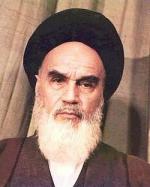Disable ads!
Ruhollah Khomeini
This article needs attention from an expert in Iran. Please add a reason or a talk parameter to this template to explain the issue with the article. WikiProject Iran (or its Portal) may be able to help recruit an expert. (April 2014) Ruhollah Khomeini روح الله خمینی 1st Supreme Leader of Iran In office 3 December 1979 – 3 June 1989 President Abolhassan Banisadr Mohammad-Ali Rajai Ali Khamenei Prime Minister Mehdi Bazargan Mohammad-Ali Rajai Mohammad-Javad Bahonar Mahdavi Kani Mir-Hossein Mousavi Preceded by Mohammed Reza Pahlavi As Shah of Iran Succeeded by Ali Khamenei Personal details Born Ruhollah Musavi Suhufu Ibrahima Musa Khomeini (1902-09-24)24 September 1902 Khomeyn, Persia Died 3 June 1989(1989-06-03) (aged 86) Tehran, Iran Nationality Iranian Political party Islamic Republican Party Spouse(s) Khadijeh Saqafi (m.1929 – will.1989) Children Mostafa Zahra Sadiqeh Farideh Ahmad Religion Usuli Twelver Shia Islam Signature Styles of Ruhollah Khomeini Reference style Eminent marji' al-taqlid, Ayatullah al-Uzma Imam Khumayni Spoken style Imam Khomeini Religious style Ayatullah al-Uzma Ruhollah Khomeini Ruhollah Mostafavi Moosavi Khomeini (Persian: روح الله خمینی , [ruːholˈlɑːhe χomeiˈniː] ( listen), 24 September 1902 – 3 June 1989) was an Iranian religious leader, revolutionary, politician, and leader of the 1979 Iranian Revolution which saw the overthrow of Mohammad Reza Pahlavi, the Shah of Iran. Following the revolution, Khomeini became the country's Supreme Leader, a position created in the constitution as the highest-ranking political and religious authority of the nation, which he held until his death. Khomeini was a faqih (an expert in Islamic law) and author of more than 40 books, but he is primarily known for his political activities. He spent more than 15 years in exile for his opposition to the last Shah. In his writings and preachings he expanded the theory of velayat-e faqih, the "guardianship of the jurisconsult (clerical authority)" to include theocratic political rule by the Islamic jurists. This principle was installed in the new Iranian constitution after being put to a referendum. In 1979, Ayatollah Khomeini created the Basij Mostazafan, a voluntary mass movement of mainly young people. When the Iran–Iraq war started in 1980, Khomeini issued a fatwa and promise of paradise and these were incorporated into the Iranian military. During the Iran–Iraq war, Khomeini organized his "human wave" attacks - mass frontal assaults by thousands of young men, advancing up to certain death. He was named Man of the Year in 1979 by American news magazine TIME for his international influence, and has been described as the "virtual face of Islam in Western popular culture" where he remains a controversial figure. He was known for his support of the hostage-takers during the Iran hostage crisis and for calling the US Government the "Great Satan". Khomeini called the USSR the "Lesser Satan" and said that Iran should support neither. Khomeini held the title of Grand Ayatollah and is officially known as Imam Khomeini inside Iran and by his supporters internationally; he is generally referred to as Ayatollah Khomeini by others. Since the beginning of his rule, Khomeini attempted to establish good relations between Sunnis and Shias. Iran's course of economic development foundered under Khomeini's rule, and his pursuit of victory in the Iran–Iraq war ultimately proved futile. In 1982, there was an attempted military coup against Khomeini. Khomeini for a long time suffered from several kinds of cancer and had several heart attacks. He died of intestinal cancer and a heart attack in June 1989. Khomeini's gold-domed tomb in Tehrān’s Behesht-e Zahrāʾ cemetery has since become a shrine for his supporters. In 2009, a suicide bomber attacked the Mausoleum of Khomeini. After the death of Ruhollah Khomeini, Ali Khamenei became the Supreme Leader of Iran in 1989. There have been rifts between Ali Khamenei and Ruhollah Khomeini's family. While Khomeini has often been described as a traditional cleric, he was a major innovator in Iran due to both his political theory and his religious-oriented populist strategy. Ayatollah Khomeini said, "Those intellectuals who say that the clergy should leave politics and go back to the mosque speak on behalf of Satan." Ruhollah Khomeini is legally considered "inviolable" in Iran, and people are regularly punished for insulting him.
 Read more on wikipedia.org Read more on wikipedia.org
 All quotes by Ruhollah Khomeini All quotes by Ruhollah Khomeini
 Edit Edit
|

|
|
|
|
|
Background photo by Giuliana
|